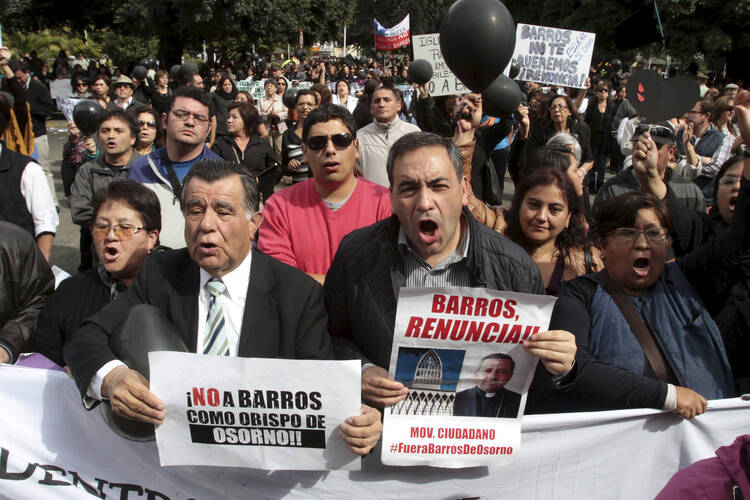The Vatican, in its first public statement on the matter, has revealed that the decision to appoint Mgr. Juan de La Cruz Barros as bishop of Osorno, Chile, was made after the Congregation for Bishops had “carefully examined the prelate’s candidature and did not find objective reasons to preclude the appointment.”
Barros was installed as bishop of the Chilean diocese on March 21, in a ceremony marked by controversy as well as open and even violent contestation between supporters and opponents, also inside the cathedral. Some 30 priests and deacons have called for his resignation, in a letter to the nuncio. Members of parliament too have protested.
The Vatican made its position known in a brief and concise written declaration from the Deputy-Director of the Holy See’s Press Office, Father Ciro Benedettini. Issued on March 31, ten days after the installation of Bishop Barros, it was published in Italian, English and Spanish, and stated: “Prior to the recent appointment of His Excellency Msgr. Juan de la Cruz Barros Madrid as bishop of Osorno, Chile, the Congregation for Bishops carefully examined the prelate’s candidature and did not find objective reasons to preclude the appointment.”
Critics and opponents have charged that Barros had known and been involved in the cover-up of the abuse of minors by Father Fernando Karadima, a well-known charismatic priest in Chile who influenced many people. Barros has flatly denied such allegations, and insisted that he did not know about the abuse until much later, in 2010, when the story became public. The Congregation of Bishops, headed by the Canadian cardinal, Marc Ouellet, clearly believes him.
A criminal case against Karadima failed because of the statute of limitations. In 2011, however, a Vatican investigation concluded he was guilty of the abuse of minors (boys) over several years, and sentenced him to a life of prayer and penitence. He is now 84 years old.
Informed sources told America’s correspondent that in the light of the considerable amount of evidence at its disposal, the Vatican concluded that there is no legal foundation to the allegations made against Bishop Barros and, consequently there was no objective impediment to his appointment as pastor of the Osorno diocese.
A number of the lay members of the Papal Commission for the Protection of Minors, set up by Pope Francis in 2014, have expressed perplexity and concern at the pope’s appointment of Bishop Barros, but sources in Rome say it is far from clear what degree of information they actually had at their disposal when they responded to press queries on the subject, apart from that which is already in the public domain.
On the other hand, it is indeed hard to believe that Pope Francis would have appointed Bishop Barros to the diocese of Osorno if he, or indeed any of his close advisors, had the slightest doubt about the charges made against the Chilean prelate regarding his alleged complicity or involvement in a cover-up of the abuse of minors by Father Karadima.
The stakes are too high in this case, particularly given the zero tolerance policy adopted by Francis since becoming pope in relation to the abuse of minors by priests, and his ongoing insistence on holding bishops and priests accountable for any abuse or cover-up. In this case, a source said, the pope has sought to be just. Those who believe otherwise surely have the obligation now to produce solid evidence to substantiate their allegations.








